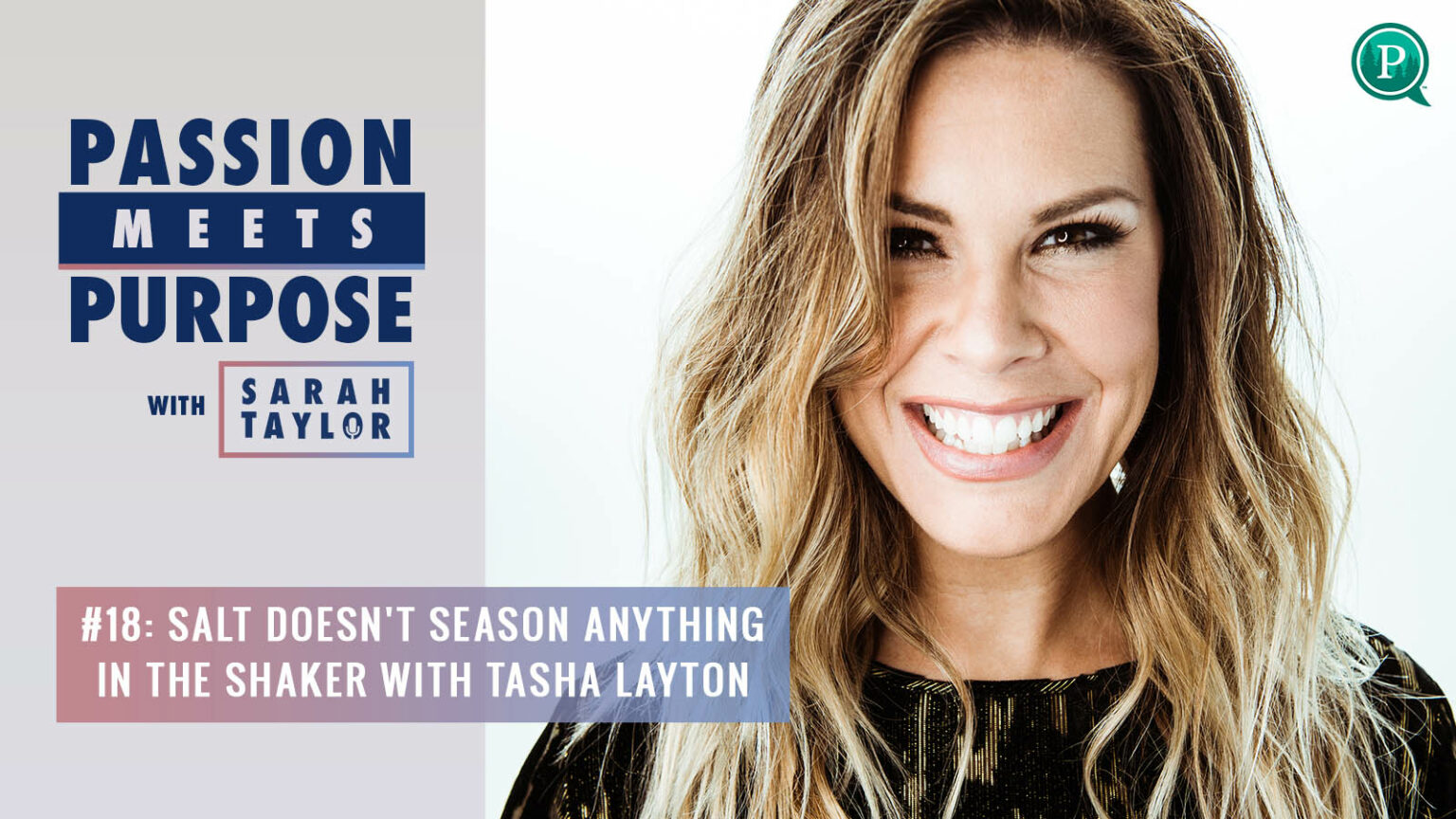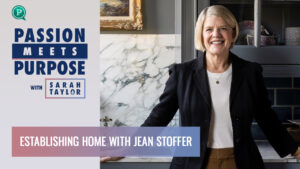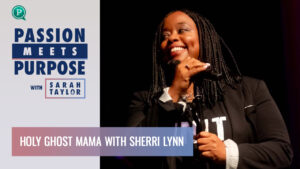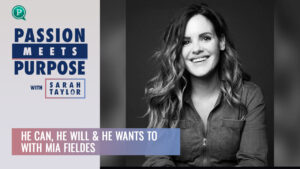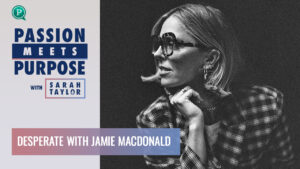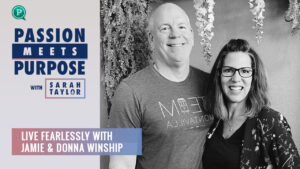Her name is Tasha Layton. She has a powerhouse voice and an even bigger heart. She has circled the globe and only has one thing left on her bucket list that actually seems pretty simple. She’s released a brand new book. You’re going to hear about her music, her two miracle babies, what it was like to tour with Katy Perry and so much more. Show Notes:
Interview Links:
- Follow Tasha Online | Facebook | Instagram | Twitter | YouTube
- Book: Boundless: A Guided Prayer Journal to Move Freedom From Your Head to Your Heart
Transcription:
[00:00:00] Tasha Layton: Salt doesn’t season anything in the shaker. And, you know, I think it’s easy for us as Christians to, to be comfortable and safe in the Christian bubble, because it is safer. It’s safer. Our world is nutso right now, and it is much safer, safer, and more comfortable to stay in the church global, but that’s not what he’s called us to do.
[00:00:26] It’s it’s crazy. Cause you ha to gain your life, you have to lose it in the kingdom of God. And when you start to give your life away, it’s almost addictive. It’s like, it feels so wonderful. You start to feel the power of the holy spirit and the kingdom of God coming to earth when you do that. And then you’re like, oh wow.
[00:00:45] Like, this is awesome. But man, sometimes it’s hard to take that first. Especially if you’ve grown up in church in a safe environment in the church.
[00:00:53] Sarah Taylor: Her name is Tasha Layton. She has a powerhouse voice and an even bigger heart. She has circled the globe and only has one thing left on her bucket list
[00:01:04] that actually seems pretty simple. She’s released a brand new book. You’re going to hear about her music, her two miracle babies, what it was like to tour with Katy Perry and so much more. But we start at the beginning cause it’s simplest to do. Tasha was raised in a very small town. And so we start with a joke Tasha, how small was it?
[00:01:30] Tasha Layton: I mean, we had a volunteer fire station and a flashing light. But we technically didn’t even own the flashing light. It was the town’s next to us, but it was like the most official thing that we could claim. So it was really small and we had a little, uh, 4th of July parade that I rode my horse in it. Yeah, it was.
[00:01:51] Sarah Taylor: Has it grown. Now, if you go back to visit?
[00:01:54] Tasha Layton: No, it’s pretty small, still, uh, you know, the neighboring towns are awesome. So it doesn’t take that long to get to something more significant, but man, how much uh, I do appreciate being out in the country, living in, you know, cities. Now, I really love going back and being in the fields and the woods.
[00:02:16] Sarah Taylor: And you know, all I do is I picture you on that four year tour with Katy Perry and like the sites and places you saw compared to starting at a town that had one borrowed flashing light. Now I don’t want to get ahead. We will eventually cover that, but that the contract and that you have toured the world.
[00:02:35] Tasha Layton: Yeah, it’s crazy that I literally got to cross off everything from my bucket list. I mean, I, I think, uh, the last two things I had on there were have a family and have a wraparound porch and I’ve had a family and we’re just waiting on that wrap around porch now. So. Yeah, that’s the last thing on my bucket list.
[00:02:55] So I probably need to make some new new things. Cause I don’t want to kick the bucket when I finished the wrap around.
[00:03:01] Sarah Taylor: Let’s see if we can pull out a couple ideas from this interview,
[00:03:05] Tasha Layton: so, okay. Okay. You can help me make my list.
[00:03:08] Sarah Taylor: All right. I’ll see if I can take some notes. Let’s start at the beginning about growing up.
[00:03:13] What was your faith life like?
[00:03:15] Tasha Layton: Yeah. Well, I grew up in a Christian home. My parents loved Jesus. We went to church every weekend and, um, were there a lot of times midweek as well, but what I kinda knew of religion was a hard pew and frilly socks, and being told to be quiet because we went to a pretty conservative church in a conservative town and, um, I just didn’t necessarily sense the presence of God on any kind of emotional level.
[00:03:41] And I was young too, but still, um, and we moved um, when I was eight or nine, and I remember walking in and I sense the presence of God for the first time. And I’ll never forget that moment. And I became really passionate about knowing God’s word and went on youth missions trips, and joined the worship team and did everything I could do to,
[00:04:02] to just be a better Christian and it’s, it’s crazy. Cause that actually made it hurt all the more when I was wounded in church, because I, I didn’t feel like I belonged growing up kind of, um, without a lot of money in a small town feeling rejected and some level, and, and then I walked into this church and I’m like, this is where I belong.
[00:04:23] Like I know that in God’s presence is where I belong. And so when I was wounded in church, uh, it was by a church leader. Really nasty. My family still doesn’t go to church this day because of it. And, um, I just thought I was crazy because I couldn’t understand how Christians could be so mean and call themselves Christians.
[00:04:44] And I couldn’t understand how, um, I could be striving so hard to do all the right things and yet being lied about. And so I didn’t know that that person had been dealing with mental illness and a history and the occult. I mean, there was a lot there that I didn’t know. And so that was when I was about 16 and I didn’t have the tools to process any of that.
[00:05:07] Um, and so when I was 16, I thought, you know what? I’ve only believed this way, my whole life, because my family brought me to church and I, I live in the Bible belt. And so, um, you know, my own doubts paired with my experiences in church, and with that church hurt, um, caused me to kind of go on my own path.
[00:05:29] Um, I was in college at the time. I switched my major from music to religion. I’m a music school drop out. Um, and I decided that I was just gonna go searching for truth, wherever that was. So I, I went to synagogue and mosque and I studied mysticism in Europe for a couple of summers. I went to Buddhist meditation camp,
[00:05:52] which is really hard for me. Meditation was always really hard for me, but, um, anyway, that searching and all that that was bringing into my spirit, coupled with what I was getting in college and combine that with my church hurt. It was just a recipe for disaster, and I tried to commit suicide and it was at that lowest of low that I realized in all of these other religions, you are striving to be good enough.
[00:06:24] You are trying to reach God and do all the right things. Even in the religious spirit of Christianity, we are trying to have God approve of us rather than rely on grace. And so at that lowest of low, I realized, man, Jesus came to earth, Emmanuel God with us. He came down. He lowered himself, he’s in pursuit of us.
[00:06:50] And something about that shifted something in my heart. And I thought, you know what? Jesus had been the only thing that had been a real to me and offered any true peace or transformation. So I decided to go back to church to a church where nobody knew. It’s like an hour and a half away. And, um, I went for a whole year.
[00:07:08] Didn’t feel a thing. I was still really numb from just being depressed. And, um, I went for a whole year and the pastor said, if you want to touch from God, come up and we want to pray for you at the end of service. And I was just a sobbing mess and left hours later. Uh, although I had a lot of healing left to go that was an altar moment in my life where God met me and I began to feel again, and it really changed the trajectory of my life.
[00:07:35] I ended up going out to seminary in California and, um, it was just a, a really beautiful time of healing and God showing me who I was in Him. Yeah. So then I ended up in the music industry and did music out there for 10 years. And I had no idea that I was going to end up doing that. Um, yeah. And then I moved to Nashville and here I am.
[00:07:59] Sarah Taylor: You are, well, let’s go, uh, expand on a couple of things that you said, cause that’s a,
[00:08:05] it’s a beautiful redemptive story. But, um, for someone that is in the place that you were at the lowest of your low listening to this right now, can you talk a little bit more about what that time was like and how it seemed like the only relief you could find would be if you were no longer living?
[00:08:24] Tasha Layton: I think I felt so isolated. I didn’t know. That I didn’t feel connected to anyone. And I didn’t know that anyone would even miss me. My self worth and my value was so low. Um, and then, you know, in some ways I wish that I had known, then what I know now, even about uh, certain people being predisposed genetically to depression or predisposed to certain struggles in life, um, inherited trauma.
[00:08:59] I mean like epigenetic markers in your body of trauma that has lived, you know, it really is true what they say in scripture about the sins of the fathers visit the sons and all that, and the old Testament. And now doctors are kind of seeing that that is the case. And so I wish that I had known then that depression was just your body’s way of trying to tell you something needed to change, you know, like not to run from it or be ashamed from it, but lean in and say, okay, well, what am I lying to myself about?
[00:09:27] What needs to shift in my life? What do I need to change? And I’d say, um, a few things really made a difference for me. Connection with people, because that’s the first thing that depression, uh, we’ll try to get you to do is isolate yourself. And then to know that I just couldn’t do it alone, that I needed help.
[00:09:47] Um, and again, that’s the last thing you want to reach out for? Cause you just, you’re in a, you’re in this place of pity in your own life and you’re in this pit. David says, you know, you lifted my feet up out of a pit and set me on a rock. I mean, he knew what that pit felt like. And I think I was in a pit and knew that I could not pull myself out of it.
[00:10:09] Um, and it wasn’t until I addressed the lies that I was believing about myself and God that I experienced true freedom from that. Because even though I had that altar moment, um, Before I moved to California to go to seminary, I still, even after seminary and after working at a church as a worship pastor and young adults, pastor and
[00:10:37] uh, being successful in the music industry and all that stuff, I still felt stuck in some ways. I couldn’t understand why I grew up in church my whole life. I knew so much truth in my head and yet I didn’t feel it in my heart. And so that process was the breakdown for me and that’s where everything was, uh, not working.
[00:10:59] And so what I had to do was dig around in my life and literally list out every pain that I’d ever experienced. Every hurtful trauma in my life and say, okay, this is what I feel. These are the vows that I made to myself. That okay, I feel ashamed right now, so I’m not going to let anyone know the real me.
[00:11:23] I’m vowed not to let anyone know the real me. And so then I had to invite Jesus into those moments to say, okay, God, because you stand outside of time because you created it, you’re, you were there when this happened to me, but you’re still there. And so in this moment, show me where you were in the room. Take me back there in my imagination.
[00:11:44] Where are you in the room and how do you feel about this and what do you want to say to me? And it was like, I literally, Sarah, felt truth moving from my head to my heart. Every single prayer on every single one of those things that I wrote down and it literally shifted my whole life. And when I, when I got done with that process, I thought I am going to do whatever I can in life to help other people experience this because I know how broken I was. I know how alone I was and how hopeless I was and how I felt like there was nothing that could help me. And I couldn’t see. All of these things in my life would work together and yet God did, he healed me and free me from those things. And now I’m the freest person I know. So it’s like, I want people to experience that because I know how terrible I felt and how amazing I feel now.
[00:12:38] I was like, so I’m just kind of using music to do that. I mean, I love music, um, and it’s kind of the tool that I have in my hand, but, uh, really, I feel like my calling is just to help people experience that free.
[00:12:51] Sarah Taylor: Did someone walk with you through that process?
[00:12:55] Tasha Layton: Yes. I would not have known what to do. I, I did not know how to go about this, and I think I needed my hand held along the way.
[00:13:07] There were moments I probably would’ve wanted to give up, or I probably needed to dig deeper. Um, and so I did have a therapist walk me through that and my experience was so powerful. I just came out with a book called boundless and it’s basically my experience of what my therapist brought me through, how God used him to, to work that process out of my life,
[00:13:29] and then I give examples of like my own story and, uh, It’s like a workbook journal type thing. And literally, I just found it that after every event I would do, people would come up to me and ask me, okay, well, how did you heal from trying to commit suicide to where you are now? Like how what’s I see the A and the Z, but where’s the LMNOP and this process was the LMNOP.
[00:13:55] And I feel like that’s available for any believer who is willing to just hear what God has to say and do a little bit of the work. Cause it’s hard. It’s hard to let your mind go back there, especially with traumatic and painful memories. Um, it’s hard to let yourself go there, but it’s worth it.
[00:14:13] Sarah Taylor: The book is boundless. We will link to it in the show notes. Tasha, some of your songs like into the sea, which over and over says it’s going to be okay. And then, uh, your one that’s currently in heavy rotation across the country, um, maybe by the time this podcast releases, you might have your first number one. It’s called Look What You’ve Done. And whenever I’m in the car driving to work and it comes on, I belt it out at the top of my lungs. I have to keep both hands on the steering wheel. Um, those songs are lifelines for people. Is there a song that was a lifeline to you that really stands out during this time?
[00:14:49] Tasha Layton: I don’t think it was a particular song, but I have always really respected Matt Redmond’s worship leading and heart of worship. You know, I just, I love the way he leads. And I think I constantly looked for resources during that season from worship leaders that I loved and respected. Um, Darlene checks always been one of course, you know, now, uh, it’s kinda like a throwback to say darling check. Cause it’s been so long, but it feels like just yesterday to me.
[00:15:20] So yeah, I think, um, God doesn’t waste anything. And every single thing that I’ve been through in the last couple of years, it has seemed to coalesce all these different streams of what God has been doing and healing in my life. And I’m seeing these songs flow out and it’s, I am so grateful that he is using it and that, man, he just doesn’t waste anything.
[00:15:50] So think that I had to go through that or not that I had to go through that, but that I went through that and he saw me out. He led me out, he lifted me out. He carried me out. He rescued me. To know that something I could be doing now could help that process for somebody else is everything. It’s what gets me up in the morning.
[00:16:16] I mean, like, doing music with a family is hard. And, you know, I was just talking to, we had an event last night, um, I was just talking to Natalie Grant and Francesca Battistelli because you know, they have kids and they’ve been doing this awhile. And, um, we just talked about how hard it is to be a female and be a mom,
[00:16:38] um, and take your kids on the road with you and do the work. But when you know that your kids are watching you live out your calling and you feel impressed, cause I could just stay at home and let my husband support us. Like man. And some days it’d be a lot easier to do that. Holy cow. Um, but I would not be fulfilled and the amount of people who come up to me after events and say, please keep doing what you’re doing.
[00:17:06] You know, you and I have done a lot of warfare on my bedroom floor, you know, as they listened to the songs and the Lord deals with their, their hearts and everything. It’s like, man, it just makes everything worth it.
[00:17:17] Sarah Taylor: Okay. So part of your story, I want to talk about some of the fun, the fun stuff that you’ve gotten to do. Your friends, talk to you into trying out for American idol and you were at some place that had how many thousands people?
[00:17:30] Tasha Layton: The rose bowl in Pasadena, California. And there were 14,000 people that showed up. They were just doing a cattle call audition and they were only choosing 200. And. Hey, none of us going to make it y’all are crazy. Like I just didn’t, I did not think that I would make it through that cattle call, especially with all the professional musicians and stuff.
[00:17:49] And so it really is, uh, just about them making good TV it’s about talent, but it’s not, you know? So, um, for whatever reason, Uh, they picked me, it was the same season as Lauren Daigle on Tori Kelly. And, uh, we were all in Hollywood week together and it was just an interesting thing cause I thought I was definitely on a learning curve because I grew up only listening to Christian music.
[00:18:12] So then all the songs that I had to perform, I had to learn from scratch and memorize all the lyrics overnight. And so, um, which I’m terrible at lyrics anyway. So that was like a huge challenge for me. But yeah, it was a crazy ride and at the end, I thought, wow, that felt really natural. Like something about that felt natural because I thought, I always thought I would just do full-time ministry in a church setting.
[00:18:35] And so when I got done with idol, I thought, man, God, I think you’re calling me to do music outside of the church. And I told my pastor, and he was like, ah, we’ve known that for years. We’re just waiting for you to figure it out. And I was like, well, you could have told me. And so then, um, ended up getting a call from actually the Kesha Rihanna Tour
[00:18:54] and I got that job and I was supposed to start Wednesday at 2:00 PM and I woke up that morning and I felt like, oh my gosh, that still small voice don’t do it. It was not even a medium volume. It was really small. And I thought, okay, I’ve gone enough. I’ve gone against that voice enough in life to know not to go against it.
[00:19:16] And so I called them and I said, um, I’m so sorry. I’m going to have to decline the job. And when I immediately, when I got off the phone, I was like, oh my gosh, did I self-sabotage, did I make a mistake? Like. And then, uh, I was like full out depressed for a couple hours. And then, um, I got a call from Katy Perry’s manager.
[00:19:35] Can you be here in 20 minutes? So I downloaded the song on my phone and learn it on the way to the audition. And then if I had had taken that other job, there’s no way I would have gotten the job with Katie, which was a much better fit and totally the Lord’s plan. Um, but yeah, it was on the road with Katie for four years. It was fun traveling the world on somebody else’s dime and not having the pressure of being an artist, but also, um, doing what you love and music.
[00:20:02] I mean, it’s, it was an awesome experience. And she’s great to the people who work.
[00:20:07] Sarah Taylor: You said Katie’s really good to her people. And that’s what I’ve heard. Now, where you touring with her when she did the documentary, are you in this?
[00:20:14] Tasha Layton: Yes, I am on the giant purple cupcake on stage. I was, uh, a purple cupcake. I was a peppermint stick.
[00:20:23] I was two different flavors of cotton candy. I have been all kinds of things. Uh, that was, uh, you know, I had a lot of wigs. I’ll just say that a lot of wigs.
[00:20:34] Sarah Taylor: Yeah. I saw a picture. You had a pink one. Super cute. Did you keep any of that?
[00:20:38] Tasha Layton: No, they’re all, you know, they’re all on the road case in LA. And then when I finished with Katie, I wasn’t even in LA, I was in South Carolina that week and everything, and I was just, yeah, no, I didn’t keep any of them.
[00:20:50] Sarah Taylor: I thought that
[00:20:51] documentary was so beautifully done.
[00:20:53] Tasha Layton: Yeah, I thought they did a great job now. They definitely edited it a lot. I mean, like I saw scenes from different things that weren’t where they said they were and all that, but, um, but I think the overall arc of the story, I think they did a great job.
[00:21:08] Yeah. And I think she’s, she’s a force of nature, man. She’s just, um, she’s really great at what she does. She’s just the boss. She really.
[00:21:18] Sarah Taylor: I love that you got to do that for four years. I love how you even had on day one, that confirmation, like the Lord knew before you did that morning, what was about to happen.
[00:21:29] You were obedient to the small voice, cause you’d learned through trial and error.
[00:21:34] And, um, and so I’m sure that when you got that gig, it was like, okay. I see what you’re doing. And you were able to walk into it with such confidence.
[00:21:43] Tasha Layton: Yeah. In some ways, in some ways I felt really comfortable and I was like, wow, God, you really made a way. And then when I got into it a little bit, I thought, why am I doing this? God? Why, why, why do you have me on this road? Like, I wasn’t sure how it was all working together. And then yeah, looking back, I thought, wow, like everything I learned on the road with Katie has informed so much of what I do now. And there were so many things that would have been roadblocks or learning curves for me, starting out in music and in the Christian side, like it would have been a roadblock, but it has been such a, um, a transition that came with ease because the Lord prepared it.
[00:22:27] And so even down from, uh, you know, Gosh, even using in-ear monitors or being on a tour bus and, um, extensive travel, heavy travel, and just all that goes into production and stuff like that. I mean, there, there’s so many things where I look back and I think, God, you, you knew exactly what I needed, even when it felt like, okay, I don’t see what you’re doing here. I just trusted and kept trucking and sure enough, he brought it full circle. He always does.
[00:23:01] Sarah Taylor: Someone told you, I don’t know if it was the same pastor that knew that you were supposed to take your ministry outside the walls of the church, but someone told you don’t keep the salt in it’s shaker.
[00:23:11] Tasha Layton: Yeah. You know, I don’t remember, uh, I don’t know if somebody told me that or if I just said it one day, I have no idea, but, um, yes, salt doesn’t season anything in the shaker. And, you know, I think it’s easy for us as Christians to, to be comfortable and safe in the Christian bubble, because it is safer. It’s safer. Our world is nutso right now, and it is much safer, safer, and more comfortable to stay in the church level. But that’s not what he’s called us to do. It’s crazy cause it’s like, you have to gain your life, you have to lose it in the kingdom of God. And when you start to give your life away, it’s almost addictive.
[00:23:53] It’s like, it feels so wonderful. And you start to feel the power of the holy spirit and the kingdom of God coming to earth when you do that. And then you’re like, oh wow. Like this is awesome. Um, but man, sometimes it’s hard to take that first step, especially if you’ve grown up in church and in a safe environment in the church.
[00:24:11] And when people get offended so easily about things and, you know, and then I was on the road with Katy where man, I saw it all. And if I had let offense drive me, I definitely wouldn’t have survived in that setting. So I think it’s just important to let the Lord lead you and let him use whatever’s in your hand, fill what’s in your heart.
[00:24:37] Brian Houston has a book about that, and I’ve always, uh, loved that phrase, use what’s in your hand to fulfill what God has put in your heart. And it’s, we make it complicated sometimes, but it’s often really simple. Try to give your life away, try to look like Jesus and do that however you physically can.
[00:24:57] Sarah Taylor: I think it also helps that you have a sense of. Is it correct that you enjoy bungee jumping and skydiving and you were almost denied life insurance?
[00:25:07] Tasha Layton: I was, I do have a lot of things on my, uh, extreme sport resume. I don’t know. Um, I don’t, I don’t do that stuff now that I’m a mom, but I definitely, uh, I did a lot of skydiving, a lot of bungee jumping, actually.
[00:25:23] Well, I consider doing, like, getting trained to go by myself, but then I think that scared me a little bit. Like, oh, what if I don’t know how to do my shoot or whatever? Like, I don’t, I don’t know about that. And so I just kept going tandem. Um, I don’t think I had the guts to do it by myself.
[00:25:44] Sarah Taylor: I want to talk about how you met your husband, who is in TobyMac’s band. Um, he plays an array of instruments. Do you just have instruments all over the house?
[00:25:54] Tasha Layton: You have no idea. We are overrun with gear and instruments. We do not use our garage. We did not use our basement. It’s insane. Um, yes, he plays a lot of instruments and he plays them really well.
[00:26:09] And the way we met, uh, we actually had a mutual friend from California. My husband used to be on staff at Saddleback church and our mutual friend, uh, from Saddleback church introduced us here in Nashville, not in California. And, um, so yeah, he I think he had me sing on a session or something, but the joke is he would have made it up.
[00:26:31] He would have invented the work for me to sing on just so he could meet me. But, uh, anyway, but it turned into marriage and two miracle babies. So, um, so I’d say he’s doing pretty.
[00:26:43] Sarah Taylor: Can you tell quickly the miracle baby story?
[00:26:45] Tasha Layton: Yes. So my husband had known for over 10 years that he couldn’t have kids. I was told that I would have an issue as well. Long story about all that, but we were both told we couldn’t have kids.
[00:26:57] And so, when we got married, we talked about adoption. We kind of started that process. And I started, um, my devotional one day on the couch and I heard the Lord say so clearly this was a loud voice, not a still small voice, not a medium voice. It was a loud one. He said it will be assigned to him. And I was like, whoa.
[00:27:18] And I was afraid to tell him because he had already grieved that for 10 years and had always said, what would it say about God, if he couldn’t heal me, what would it say about me? If he wouldn’t heal me, have I done something to deserve this? Would I be a bad dad? You know, all the lies that we all, you know, we think as humans.
[00:27:35] And so, um, I told him, and, uh, we’d had doctors say is infertility probably had to do with a back injury. We were in Uganda on a missions trip, and I was leading that song miracles by Jesus culture, and I look on the road. And keep us on the ground crying. And he came up to me in the middle of the song, I want to leave this on for thousands of people.
[00:27:56] And he’s like coming up in the middle of the songs. Like I think God just healed my back. I’m warm all over and I can’t get it to hurt. And so I was like, you should tell everybody. So he got on the mic and told everybody had just visible healings all over the room. It was incredible. Miraculous. I mean, just insane.
[00:28:13] And so they prayed for us that night that we’d be able to have a baby and we were pregnant with Levi two months later. And, um, after we had Levi, I thought, man, I would, I would love to have another. I don’t, I don’t think our family has done. So we prayed again and. Again, three months later, we were pregnant with Lyla.
[00:28:31] So yeah, they are wonderful.
[00:28:33] Sarah Taylor: How old are they now?
[00:28:34] Tasha Layton: Um, Levi’s four and Laila’s 20 months. Yeah. So I had her in February right before everything shut down in 2020.
[00:28:43] Sarah Taylor: And so, I mean, even then you got all this time with her.
[00:28:46] Tasha Layton: Yeah. And I would have been on this. Like I w I couldn’t have been able to get that time back.
[00:28:52] And so I was actually really, I had a great 20 20, I think 2020 was one of our best years as a family. And sure there were a lot of unknowns and it was difficult on some level, but man, as a family, we, we just got to spend a lot more time together and it was awesome.
[00:29:08] Sarah Taylor: So, so tell me, do you, I want to talk about the book a little bit before our time is done. Um, When did you start working on the book?
[00:29:18] Tasha Layton: You know, I started a version of the book maybe four or five years ago. And then I spoke at a conference up in Chicago and after the conference, just this drove of women came up and just said, you know, what do we do? How do we walk through this process of
[00:29:38] getting free from the lies that we’ve believed about ourselves. And what did you do? What was the process? And so I recognized that there was a need that I was like, I cannot walk with every person on this journey, but I can provide a resource and all the gold nuggets that God gave me. And so, um, I stopped
[00:29:58] working on the book that I was working on, and then I started on this one, so was a little, little under two years ago, but I hit it hard this year. Um, and so it’s, it’s a workbook and it literally is everything that my therapist took me through. Um, to get the freedom that I knew in my head that I can experience into my heart.
[00:30:20] So I was actually living it.
[00:30:21] Sarah Taylor: I hear that you have a powerful story about when you were doing some work overseas and God protected you in a hotel room. Go ahead and let us know this story.
[00:30:29] Tasha Layton: So we were in Kenya and we were in a place that had experienced a lot of election violence from, uh, just a regime that was trying to take up.
[00:30:39] It’s just a thing in Africa regimes, just try to take over. And, um, we were in a town where, when the election violence took place, um, there were children being machete in the streets. It was a very, very volatile area. And, um, I had gone into the city to do some training, um, both with, uh, churches there, that government there,
[00:31:02] and then also, um, we held sort of a camp for kids in the city. And, um, we saw, long story short, some of those regime, uh, came into the hotel we were staying, it was me and five other girls in the room and we barricaded the door shut. And, you know, and in all reality, it’s like they should have been able to open that door.
[00:31:24] And they were much stronger than us, and I know that the Lord protected us. And so it’s interesting because I have experienced a lot of things in my life, but that one in particular, I thought, you know what, if, if I go down this way, I’m okay with that. Like I was ready and it was such a life-changing experience.
[00:31:46] Cause I thought if anyone. Could actually be in danger when you can actually be in danger uh, this is not, we’re not playing games. This is not, um, this is not the U S. This is not, you know, what we’re used to, this is the real deal. And so it was just an incredible experience and of God’s protection and his peace in that moment.
[00:32:09] It was like, knowing that death could have been imminent, and yet I felt so firm. It was almost like it was almost like martyrdom or something where it was like, okay, if I go out this way or I’m going out, like this is if I had to die for anything, what I am doing here, I believe in enough to die for it.
[00:32:28] And, uh, it was just an amazing, um, experience with God.
[00:32:33] Sarah Taylor: Tasha, you speak with such beautiful authority. Your songs feel that way as well. I’ve heard you in several other interviews and I saw you recently on the good morning America interview that you did. And, um, I just love how intertwined with your sentences
[00:32:47] you also have scripture. And, um, I’m just so grateful that you put your life as an open book on display for others to be able to hear wherever they are at on that journey to see that it’s worth it to hold on and trust that the Lord, the same way that he is in your small details, the same way that he speaks and reveals himself to you, he will do for anyone who calls upon his name.
[00:33:13] Tasha Layton: Yes. And I wasn’t always this open either. I was really, I don’t know if you’ve read Brene Brown’s book daring greatly, but in it she talks about vulnerability shields. I had all. It was like, I was not vulnerable because I was self protecting my whole life. And I had this vision at one point of Jesus, literally standing in front of me, reaching through my chest and grabbing my heart like this and clasping it and going, nothing could touch you.
[00:33:41] Like you are safe with me. And I’ve never, that image has never left me. And I think when I experienced that vision or whatever, that was, it changed my life. And I I’m an open book now, but I definitely wasn’t before. I’m always concerned about what people might think or, um, saying you’re doing the wrong thing or being rejected or being a failure or not good enough. I mean, like the list goes on. Like we can insert life and, uh, so yeah, I’m really thankful for what God’s done in my heart that I could feel free enough to share my story.
[00:34:18] Sarah Taylor: The book is boundless. Well, congratulations on releasing it into the world and thank you for your time.
[00:34:23] Tasha Layton: Thank you,
[00:34:27] Sarah Taylor: Tasha Layton. I hope that you have enjoyed this conversation as much as I did and definitely pick up Tasha’s new book for more. I want to thank EP Edmonds for leaving a review at apple iTunes. She quoted a couple of things that she enjoyed from the Scott Hamilton episode. She said, days become years and years become lives.
[00:34:49] I loved that as well. It’s really the theme of the Passion Meets Purpose podcast. It’s all about what you are naturally good at and how you use that talent to give back to the world. So, yes, please leave a rating and a review wherever you listen, and I will see you again in two weeks.
Follow this podcast:

